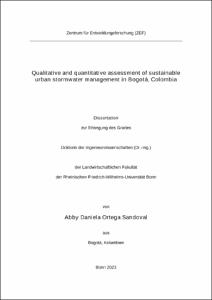Qualitative and quantitative assessment of sustainable urban stormwater management in Bogotá, Colombia

Qualitative and quantitative assessment of sustainable urban stormwater management in Bogotá, Colombia

| dc.contributor.advisor | Bharati, Luna | |
| dc.contributor.author | Ortega Sandoval, Abby Daniela | |
| dc.date.accessioned | 2023-10-02T13:51:09Z | |
| dc.date.available | 2023-10-02T13:51:09Z | |
| dc.date.issued | 02.10.2023 | |
| dc.identifier.uri | https://hdl.handle.net/20.500.11811/11081 | |
| dc.description.abstract | Rapid population growth and urbanization have triggered abrupt changes in land use, intensifying impervious surfaces and the loss of green areas. Sustainable urban drainage systems (SUDS) are an appealing alternative to urban runoff and flood risk management. Their operation is mainly based on four dimensions: peak flow and total volume control, improvement of stormwater runoff quality, increase in biodiversity, and amenity provision. Based on the concepts of inter- and transdisciplinarity, this thesis aimed to fill three main gaps in the study of SUDS: (i) analysis of the factors that promote or hinder a greater uptake; (ii) methods for selection and location considering multidimensional local context constraints; and (iii) model-based evidence of hydraulic control capabilities.
This research was conducted at the community level in Bogotá, the capital city of Colombia, framing a relevant case study for the assessment of SUDS in highly urbanized flood-prone areas with several space constraints on public and private land. An interdisciplinary approach was used to explore the barriers to and benefits of SUDS implementation, considering the perspectives of the public sector, a private non-profit organization, urban developers, and community members. After identifying and categorizing 39 barriers, it was evident that technical barriers continue to have a significant impact on SUDS adoption. Moreover, the evaluation of benefits yielded 34 results, demonstrating the broad scope of SUDS at a social, economic, and environmental level. The categorization of barriers was used as input to develop a transdisciplinary methodology for the selection and location of SUDS that integrates not only the site’s physical restrictions but also local context limitations (cultural/behavioral, financial, institutional/organizational, technical, political, and urban form). Here, the concept of transdisciplinarity was incorporated through (i) the co-production of knowledge involving academic and non-academic actors, (ii) the participation of an expert panel pooling expertise on sustainable urban water management in six different regions around the world, and (iii) the use of multiple tools such as specialized literature, geographic information systems, fuzzy logic, and multi-criteria decision analysis. A 70-ha urban area was used as a case study to identify the most feasible SUDS typologies on both public and private land. Thereafter, numerical models were employed to assess SUDS performance in a 50-ha neighborhood, and 24 scenarios were developed to contrast the hydrologic-hydraulic response of a highly discretized (HD) one-dimensional (1D) model and a coupled one- and two-dimensional (1D–2D) model. The selected SUDS typologies, i.e., rainwater harvesting systems and tree pits, arose from the application of the previously described transdisciplinary methodology and local management conditions on public land, respectively. Findings revealed that, in addition to their renowned hydrologic control capabilities (peak discharge and total volume), SUDS also aid in the reduction of the number of flooded junctions, overloaded conduits’ length, overloading time, nodal inundation depth, and waterlogging extent. Furthermore, the HD 1D model was able to reproduce the results from the coupled 1D–2D model in terms of hydrologic response and some hydraulic control indicators. Through the course of this thesis, it became evident that the implicit multidimensionality of the sustainable management of urban drainage requires continuous efforts by various communities of knowledge to bridge the numerous gaps that today prevent a more robust SUDS implementation. This dissertation proposes a novel approach by integrating inter- and transdisciplinary thinking within a field of knowledge that is typically approached from a technical perspective, providing significant tools and information to more firmly transition from traditional drainage approaches to multifunctional options such as SUDS. Although the findings of this research are framed within the socio-institutional-spatial features of a developing city such as Bogotá, it is expected that this thesis will influence the sustainable management of urban drainage—and urban water as such—in other contexts through the different methodological applications presented here and the positive results that, in light of current evidence, can be produced with this paradigm shift. | de |
| dc.language.iso | eng | |
| dc.rights | In Copyright | |
| dc.rights.uri | http://rightsstatements.org/vocab/InC/1.0/ | |
| dc.subject.ddc | 620 Ingenieurwissenschaften und Maschinenbau | |
| dc.title | Qualitative and quantitative assessment of sustainable urban stormwater management in Bogotá, Colombia | |
| dc.type | Dissertation oder Habilitation | |
| dc.identifier.doi | https://doi.org/10.48565/bonndoc-139 | |
| dc.publisher.name | Universitäts- und Landesbibliothek Bonn | |
| dc.publisher.location | Bonn | |
| dc.rights.accessRights | openAccess | |
| dc.identifier.urn | https://nbn-resolving.org/urn:nbn:de:hbz:5-72647 | |
| dc.relation.doi | https://doi.org/10.1016/j.ijdrr.2023.103621 | |
| dc.relation.doi | https://doi.org/10.1080/1573062X.2023.2233494 | |
| dc.relation.doi | https://doi.org/10.2166/wst.2023.173 | |
| ulbbn.pubtype | Erstveröffentlichung | |
| ulbbnediss.affiliation.name | Rheinische Friedrich-Wilhelms-Universität Bonn | |
| ulbbnediss.affiliation.location | Bonn | |
| ulbbnediss.thesis.level | Dissertation | |
| ulbbnediss.dissID | 7264 | |
| ulbbnediss.date.accepted | 28.08.2023 | |
| ulbbnediss.institute | Zentrale wissenschaftliche Einrichtungen : Zentrum für Entwicklungsforschung (ZEF) | |
| ulbbnediss.fakultaet | Landwirtschaftliche Fakultät | |
| dc.contributor.referee | Rodríguez, Juan Pablo | |
| dc.contributor.referee | Borgemeister, Christian | |
| ulbbnediss.contributor.orcid | https://orcid.org/0000-0001-9879-7270 |
Dateien zu dieser Ressource
Das Dokument erscheint in:
-
E-Dissertationen (1014)




